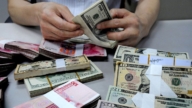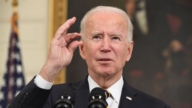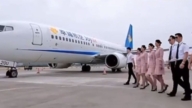【新唐人2012年8月29日讯】中国经济增长已经连续六个季度下滑,已有更多的专家“看衰”中国经济前景;更有观点认为,中共当局只能以再次“吹泡泡”的方式,或者“口头宣传”,来带动目前的中国经济萧条。那么中国的经济究竟有没有出路﹖十八大前中共当局该如何因应,我们来看看专家的解读。
“中国高增长神话即将破灭?”、“中国的经济即将崩溃?”这些标题,是1个多月之前媒体的报导,似乎不是危言耸听。因为,目前如“出口疲弱 经济坐闷锅”、“前景看衰 中国再‘吹泡泡’救市”,更多的专家,以不同的论点看衰中国经济。
早有专家认为,中国不是“市场经济”,而在中共“十八大”更替的时候,当局能否再次营造一番荣景,在繁荣稳定的背景下换届﹖恐怕不被专家看好。
美国“南卡罗莱纳大学艾肯商学院”教授谢田分析,中共当局为保荣景仍在持续推行刺激经济政策,将保增长作为优先,放弃了控制通货膨胀的目标。
美“南卡罗莱纳大学艾肯商学院”教授 谢田:“但是,我们从最近的1-2个月的情况看,中国经济的局势继续恶化,继续在实施硬着路。所以实际上,中央政府它即使想刺激经济、挽回经济,或者保持所谓的经济繁荣的假象,但恐怕它是力不从心了。”
据报导,大陆财经作家吴晓波认为,“胡温”十年任期第三度由政府启动的大规模投资,总体来看,所采取的办法依然是靠制造泡沫。
谢田认为,十八大前,中共必然还会做出一些努力。不过,中共中央对通货膨胀还是有点顾忌,目前不敢马上再印更多的钞票。
谢田:“但是地方政府它为了保持它自己的运行,它很可能在经济走向跟中央政府也不一致,投资、借款来刺激当地的经济,所以我们看到中国中央政府和地方政府之间,也有点大难来时各自飞那种感觉,各顾各的在自行其事。”
另外,旅美中国经济社会学者程晓农认为,实际上中国经济早就陷入困境;对中国经济抱持乐观者,都是一厢情愿。
旅美中国经济社会学者 程晓农:“故意看低,就是英文Underestimate,低估中共问题的严重性,夸大中共经济光彩的一面,配合中共作宣传。实际上,中共经济的问题远远比它自己公开承认的严重得多,而且这些问题都是没有办法解决的。”
程晓农指出,中国经济陷入困境,主要来自内地占人口百分之7、80的劳动力和百姓没有足够的消费能力,中国经济无法自我支撑,以致完全依赖出口。
程晓农:“其实这里面潜伏的问题更大,收到的外汇,需要同样对应的在大陆内部投放人民币,这二十多亿都是货币超量投放,所以必然的要带点通货膨胀,结果是自动的拉高工资成本,很快使大陆产品没有办法在国际市场维持竞争力。”
由于,通货膨胀造成工资成本高涨,外商无利可图陆续撤资,而向内陆转移的外商,未来需面对同样的问题。
程晓农:“所以,大陆现在其实已经有点病入膏肓的味道。中共政府根本就不听,原因是 No choice它没有办法。那么,他走到今天这一步,就像走上悬崖一样,一步一步往上走到最后发现到头了,退也退不回去了。所以,中共其实从今年上半年以来,一直在设法增加货币供应,想要刺激经济,但是没有用。”
程晓农分析,目前中共当局可以解决中国经济困境的唯一方式,就是继续增加货币供应,但这同时将继续制造通货膨胀,最终的结果仍然是“殊途同归”。
采访编辑/梁欣 后制/萧宇
Experts: China’s Economy In A Serious Trouble
It is the 6th quarter since China’s economy is on a downslide.
More and more experts are pessimistic about its future.
Some believe the CCP can only use the method of “bubbles”
or propaganda to speed up the grim economy.
Is there a way out for China’s economy? What would CCP
(Chines Communist Party) do before its 18th congress?
“The myth of China’s rapidly increasing economy will come
to an end,” “Chinese economy will face collapse,” etc.
These headlines were reported more than a month ago.
But now, many experts look at it with different eyes.
Some experts believe
China does not have market economy.
Before the 18th congress, experts do not look favorably
to Chinese regime’ chance to create economic stability.
Professor Xietian from South Carolina Aiken School
of Business analyzes the issue.
He thinks, in order to maintain an image of economic glory,
the CCP continues to promote economy’ stimulating policies, and has given up the goal of controlling inflation.
Professor Xietian: “The past 1-2 months show that China’s
economy is worsening, taking on a strategy of dragging out.
Thus, even if CCP wants to stimulate economic growth
or maintain the so-called false image of economic glory, they are not able to do so.”
Reports talk about the view of Mainland economic writer,
Wu Xiaobo.
Wu believes, looking at it from a broader perspective,
since the 3rd largest investment of the Hu and Wen’s rule, the method used is still just creating bubbles.
Xietian thinks, CCP will still put in some more efforts
in this direction before the 18th congress.
However, the CCP still has some worries concerning
inflation and is afraid to print more money right away.
Xietian: “In order to maintain its own operations, local
governments may not take the same route as the central government on the matter of economy.
They may not invest or loan to stimulate local economy,
so we see how central and local governments differ.
There is a sense that everyone does their own thing,
and takes their own paths when big tribulations come.”
Economist Cheng Xiaonong believes China’s economy
has been in trouble for quite a while,
Those who are optimistic about China’s economy
are just having a wishful thinking.
Cheng Xiaonong: “They are underestimating the seriousness
of CCP’s problems and overly glorifying its economy, cooperating with the CCP propaganda.
In reality, CCP’s economic problems are much more serious
than it admits, and these problems are not solvable.”
Chen Xiaonong points out, a key reason for China’s economy
to be in trouble is its low consumer power.
Inland people take up 70-80% of the labor force,
and Chinese people do not have enough consumer power.
Chinese economy cannot support itself,
thus it solely relies on exports.
Cheng Xiaonong: “In reality,
there are deeper problems here.
The foreign cash it receives have to be turned
into the equivalent of RMB in Mainland China.
This leads to more than two billion over-supply,
so inflation is necessary.
The result would be wages going up, and Mainland products
being unable to maintain its global market competitiveness.”
Due to the inflation causing salaries to go up, foreign
companies cannot make profits and continue to withdraw.
Yet, foreign companies that still go to Mainland China,
will face the same problem in the future.
Cheng Xaionong: “So there’s a sense of things being
beyond repair, so CCP doesn’t listen, as it has no choice.
Hence, it has gotten to this point, like climbing a cliff, step
by step up, until it realizes this is the end, with no way back.
In reality, since the first six months of this year, it has been
trying to increase money supply, wanting to stimulate the economy, but there is no way out.”
Cheng Xiaonong analyzes, currently the only way for Chinese
regime’s economic woes is to increase the money supply.
However, this will create inflation, thus it’s just
like taking different routes to the same destination.



























